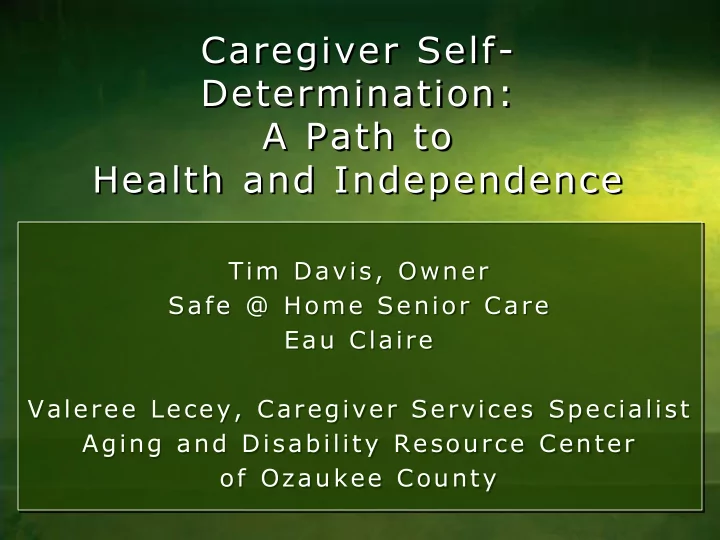

Caregiver Self- Determination: A Path to Health and Independence Tim Davis, Owner Safe @ Home Senior Care Eau Claire Valeree Lecey, Caregiver Services Specialist Aging and Disability Resource Center of Ozaukee County
Objectives for the Session At the end of this session, participants will understand: • The challenges of caring for someone • How to reduce health and financial risks by seeking out support and using caregiver resources • The benefits to care receivers when the caregiver uses respite • What the “7 deadly emotions of caregiving” are and how to deal with them • How to maintain your physical and mental health while caregiving
Challenges of Caregiving Different living situations can present different challenges: • Caring for someone living alone in their own home • Caring for someone living with a spouse or family members • Caring for someone living in a community setting or healthcare setting
Health Risks for Caregivers Without Proper Support • Less likely to take good care of self, including healthy eating, exercising, having routine checkups and medical tests, etc. • Lowered immunity/get sick more often • Higher levels of stress and depression • Greater likelihood of using prescription drugs, smoking, and alcohol consumption J Am Acad Nurse Pract. 2008 Aug;20(8):423-8. doi: 10.1111/j.1745-7599.2008.00342
Health Risks for Caregivers Without Proper Support (cont.) • Increased cardiovascular and circulation problems • More likely to develop a chronic condition like diabetes, arthritis, ulcers, or anemia • Slower wound healing • Increased risk of premature death
How Poor Caregiving Can Affect the Care Receiver • More doctor’s visits • More hospitalizations • Relationship with family deteriorates • Earlier care facility placement
What’s in it for Me? Accessing resources early as a caregiver will: • Significantly reduce caregiver and care receiver injuries • With quality in-home care (including respite), caregivers and care receivers have 25% fewer doctor’s visits each year • Entry into an institution is delayed with proper care • Reduce the risk of early death for both caregiver and care receiver
Help and Supports: Where do We Go From Here? • “Self -determination includes asking for and accepting help!” • How to find the support and help that’s available • What are the support services and resources that can preserve the caregiver’s health?
Take Advantage of What’s Out There! Some of the available resources and supports: • Respite care • Counseling • In-home care • Falls Prevention • Caregiving classes • Health promotion workshops • Adult day programs • Caregiver cafes • Support groups • Memory cafes • Home delivered meals • Caregiver conferences, • Help with chores days of renewal, etc. • Emergency response • Caregiver websites systems
How to Maintain Your Emotional Health While Caregiving The 7 deadly emotions of caregiving and how to deal with them: • Guilt • Resentment • Anger • Worry • Loneliness • Grief • Defensiveness
Maintaining Your Emotional Health While Caregiving • The Benefits of Joining a Support Group • The Benefits of Educational Programs for Caregivers
Maintaining Your Physical Health While Caregiving • Engage in an active lifestyle for good health • Physical exercise is essential for many reasons • Exercise can significantly reduce the risk of developing both chronic physical conditions as well as Alzheimer’s disease and other dementias • Exercise is most effective when done regularly
Benefits of Staying Physically Active • Helps you stay strong and fit enough to keep doing the things you like to do • Improves your health and helps you maintain your independence • Helps prevent or delay many diseases and disabilities • Helps manage stress and improves your mood • May help reduce feelings of depression • Can improve or maintain cognitive function http://nihseniorhealth.gov/exerciseforolderadults/healthbenefits/01.html
Benefits of Walking Daily walking is one of the easiest and BEST prescriptions for health: • Maintains thinking functions • Increases blood flow to the brain while decreasing blood pressure • Reduces the risk of diseases and conditions that can decrease your independence • Helps stimulate your brain functions in seeing new sights, chatting with fellow walkers, and just getting out of the house.
Resources for Caregivers: What is Working Now? County Aging & Disability Resource Centers • National Family Caregiver Support Progr am • Alzheimer’s Family Caregiver Support Program • County Dementia Care Specialists • County level dementia coalitions • County level caregiving coalitions • “Dementia Friendly Community” training • Memory Cafes • Support groups •
Thank You!
Recommend
More recommend